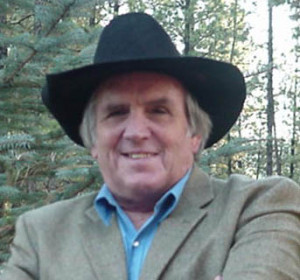Something got me thinking about what I’m leaving behind as a writer. It was the death a few days ago of a dear friend, the novelist Stephen Bly.
Steve and his wife, Janet, were two stalwarts in a group of novelists I’m part of and a lovelier couple you will never meet. They had been together since high school in Visalia, California, where they sat next to each other in a first year English class.
Steve was a man’s man, John Wayne-size. He was a real westerner, and came by his cowboy hat honestly. He was born in 1944, grew up on a farm and ranched a good part of his life. But he also graduated summa cum laude in philosophy from Cal State University, Fresno, and went on to earn an M.Div. from one of the premier theological seminaries in the country, Fuller. He had a deep, resonant voice, the kind that made you sit up and listen. He was an ordained minister and served as mayor of the small town in Idaho (pop. 303) where he and Janet lived.
I heard a story about him once that went something like this. A woman called his house late at night. She was distressed because her water had been shut off for lack of payment to the water company. Steve said there was nothing he could do and that the bill would have to be settled.
She huffed at him. “That’s not what I expected to hear from a minister.”
Steve said, “Oh, you’re calling the minister? I thought you were calling the mayor. I’ll take care of it for you.” And he did. That was Steve Bly.
He loved to write, especially about his beloved West. He was a stickler for authenticity. Once, when we were at lunch together at a writers conference, I mentioned one of my favorite films, Shane. Steve didn’t care for it (he thought, for example, that Jean Arthur shouldn’t have been wearing pants). “Them’s fightin’ words,” I said and stood up. Steve stood up across from me. We looked like we were going to draw on each other. Then we cracked up and so did everyone else.
Several years ago, at a writers retreat, Steve talked about why he wrote. First and foremost, he said, it was for “Jannie-Rae,” his wife and partner. Then, he said, it was for that single mom who has put in a hard day at work. She picks up the kids from day care, brings them home, feeds them, gets them washed and in bed. And now she has a few moments to herself before falling asleep, and picks up a book. If it was his book, he wanted it to be an uplifting story, fully captivating and life affirming. Reminded me of something Dean Koontz once said: “I write to entertain. In a world that encompasses so much pain and fear and cruelty, it is noble to provide a few hours of escape.”
That’s a great testimony for a body of work, I think. Our sojourn on this earth is brief. It’s good for a writer to stop every once in awhile and ask, What sort of writing do I want to leave behind?
Steve’s writing and life were noble in the truest sense. People who came into contact with him personally, and through his books, were the better for it.
I’ll remember Steve as a consummate professional, the kind of workman I admire and try to be myself. He’d been in a battle with cancer for several years, fought a good fight, then took a turn for the worse a few weeks ago.
Even so, Steve kept writing. Right up to the end. His last post on Facebook, a week before he died, was this: “Despite being poked, prodded, tossed and turned every hour by numerous nurses while I bide my time in a quarantined hospital bed, have managed to complete 5,700 words rough draft on Stuart Brannon’s Final Shot. Only 69,300 more words to go.”
Well done, good and faithful servant.

